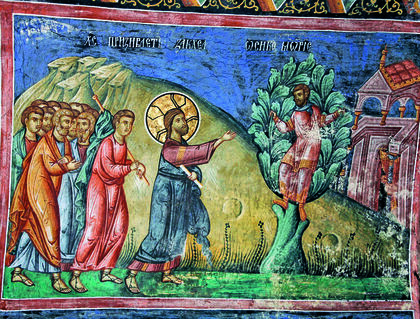
On the 32nd Sunday after Pentecost, we heard the Gospel reading about Zacchaeus. The Lord was passing through Jericho not long before His Passion. It was known that the Lord was passing through Jericho, but this Zacchaeus, on the final occasion at his disposal, for the Lord didn’t pass through Jericho again after this, wants to see Him. We know he was a rich tax collector. We want to dwell upon this desire that Zacchaeus had to seek out the Lord. He sought to see Him, but couldn’t do so because of the multitude. So, he had this yearning, this surging force within him, to see the Messiah. To see His face, to see Him from close up.
If we’d take with us on this thing from today’s Gospel, this impulse to see the Lord, that would be extraordinary. Zacchaeus knew that He was passing through Jericho. We, too, know that He passes through; He passes through the Liturgy on Sunday. Elder Aimilianos of Simonopetra even said: “Here, in the services, in the church, everything is Christ. The priest, donning all his vestments, keeps the place of Christ.” Elder Aimilianos commented further: “What would you do when you see Christ? You try to touch Him, to grasp Him. Like Mary Magdalene did, when the Lord prevented her, because He hadn’t ascended to His Father.” This should be our impulse, to want to see Him too. This fact – that we long to see Him, to grasp Him – is natural, but also an indication that we are alive in our soul. The harlot succeeded. Zacchaeus also succeeded. Just about anyone who wants to, succeeds, according to Elder Aimilianos’ maxim: “Man succeeds in whatever he proposes.”
It would be good if we also had this impulse to see our Lord. This impulse is life-giving. And when you have this desire to see the Messiah, the Christ, to hear Him, to touch Him, and to stand before Him – like the harlot or anyone else did, with the same heart – what do you do? To accomplish this, Zacchaeus found a sycamore tree. He didn’t know about that sycamore tree. But, all of a sudden, it proved to be very important. He, being small of stature, climbed up into this sycamore tree. We, too, are small of stature. From where we are, we can’t see much of Him. We’re too small. And we need to climb up somewhere. Yes, we’re small, we’re buried in this world, beneath our worries, beneath our problems, beneath our priorities, and we can’t see Christ Who is passing through. Others see Him, but we can’t see Him. So, then, we need to find a sycamore tree and climb it. Everyone needs to find such a sycamore tree. It can be a deep thankfulness. It can be a deep repentance, naturally. It can be an act of charity, something to lift us up a bit above our world. It can be a deep prayer, maybe a prayer with tears. Each of us needs to find such a sycamore tree, to lift myself up above where I am and to strive towards Him, to see Him. And then, He will see me too. He lifts up His eyes and sees me.
Elder Zacharias Zacharou, speaking about our participation in the Divine Liturgy, gave this rule: however much you invest in preparing for the Liturgy is how much you receive. The measure of your preparation for Liturgy, for presenting yourself before the Lord, is how much you get. However much space you make in your heart is what gets filled. And, he says, through our preparation for Liturgy, which implies prayer, repentance, charity, and humility, we bring gifts to Liturgy. If we uncover a humble thought in our heart, that becomes a gift for the Liturgy, and I go to offer it to the Lord. If I have a sincere feeling, if I have a deep thankfulness, anything. These are the gifts we can bring and which God anticipates from us.
In our preparation for Liturgy, says Elder Zacharias, knowing that I want to see Christ in Jericho or that I want to meet Christ, I prepare myself. And he says that through our preparation, we prepare a place in our soul, meaning that a dwelling is made in our heart, meaning that we gather ourselves. We withdraw from the world and concentrate more and more on our inner life. And the place is in our heart, we make a dwelling in our heart, in the place where we stand before the Lord as we are. That is the sycamore tree. Everyone needs to find their sycamore tree, to create it, each as he can. If we have Zacchaeus’ desire to see the Lord, and we try to prepare, we will collect ourselves and we’ll make a small sycamore tree within us, enough to catch a glimpse, to sense the Lord. And, with each Liturgy, better and better. So, with this aim in mind, we’ll be able to see the Messiah, or rather He’ll be able to see us as we are. And no act of presenting ourselves before God remains barren of fruit. If we succeed, we’ll find much grace, like Zacchaeus: “Today salvation has come to this house.”
